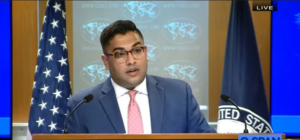India signed a 10-year contract with Iran on Monday to develop and operate the Iranian port of Chabahar, the government said. This would strengthen relations with the governments of both nations.
India has been trying to develop Iran’s Chabahar port to enhance trade and connectivity with Central Asia. This plays a strategic role for India as it enables it to bypass the Karachi and Gwadar corridors in Pakistan.
Staggering Chabahar deal
The India-Iran deal has faced a lot of restrictions in the past. Iran and China finalised a $400 billion strategic deal, but later Iran called off the deal with India due to delayed finances. It’s been less than 10 years now and the port development hasn’t still finished.
In May 2016, during the visit of Prime Minister Narendra Modi to Tehran to sign the Chabahar agreement with President Hassan Rouhani, IRCON signed an MOU with the Iranian rail ministry. This MOU was for the construction of the Chabahar Zahedan railway as “part of transit and transportation corridor in trilateral agreement between India, Iran and Afghanistan”.

However, despite several site visits by IRCON engineers, and preparations by Iranian Railways, India never began the work, ostensibly due to worries that these could attract US sanctions. The US had provided a sanctions waiver for the Chabahar port and the rail line to Zahedan, but it has been difficult to find equipment suppliers and partners due to worries they could be targeted by the US, said officials. India has already “zeroed out” its oil imports from Iran due to the sanctions.
India signs Chabahar agreement
Eight years after completing the general framework of cooperation on the Chabahar Port in Iran, both nations signed a 10-year contract for its operation.
The agreement was signed between Indian Ports Global Ltd. (IPGL) and the Port and Maritime Organisation (PMO) of Iran, enabling the operation of the Shahid-Behesti terminal. Subsequently, IPGL will invest approximately $120 million in equipping the port.
India has also offered a credit window equivalent to $250 million for projects aimed at improving Chabahar-related infrastructure.
The agreement was signed in the presence of Ports, Shipping and Waterways Minister Sarbananda Sonowal and Mehrdad Bazrpash, Minister of Roads and Urban Development of Iran.
“As India continues to invest in Chabahar port, its efficiency and capacity will be further enhanced, solidifying India’s commitment to the region’s economic development. India will use the port for humanitarian aid shipments, reaffirming its commitment to support regional development beyond commercial interests, showcasing its commitment to fostering goodwill and stability in the region,” Mr Sonowal said.
🇮🇳🇮🇷| Scripting a new chapter in bilateral partnership!
Minister @shipmin_india & @moayush @sarbanandsonwal witnessed the signing of the long-term contract for the operation of the Shahid Beheshti Port in Chabahar, between India Ports Global Ltd. & Ports and Maritime… pic.twitter.com/hUddkyQrkE
— Randhir Jaiswal (@MEAIndia) May 13, 2024
The Iranian Ambassador to India Iraj Elahi said, “In this context, the two sides reached a formula that would provide for both their interests. In short, I can say that according to the contract, any dispute should be resolved in the atmosphere of mutual trust and the will of the heads of the two countries.”
The Iranian envoy also rejected any conflict between India-Iran’s cooperation on Chabahar and any economic plans and obligations of Iran towards other countries. The agreement between Iran and India for the development of the Chabahar port was signed years before China’s One Belt One Road project and is based on the common interest of the two countries, he added.
US threat after Chabahar contract
Hours after the contract was signed, the United States warned that “anyone” considering business with Tehran should be aware of “potential risk of sanctions.”

“We are aware of these reports that Iran and India have signed a deal concerning the Chabahar Port, I would let the government of India speak to its own foreign policy goals, vis-a-vis the Chabahar Port as well as its own bilateral relationship with Iran,” Vedant Patel (US state department principal deputy spokesperson) said in the press briefing on Monday (local time).
He added: “I would just say…US sanctions on Iran remain in place and we will continue to enforce them.”
“Any entity, anyone considering business deals with Iran, they need to be aware of the potential risk they are opening themselves up to, potential risk of sanctions,” Patel said.










